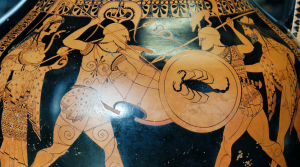Thucydides is on a roll these days.
The ancient Greek historian of the Peloponnesian War, who lived almost 2,500 years ago, makes the title of Graham Allison’s prominent new volume, Destined for War: Can America and China Escape Thucydides’s Trap?
The great historian merits this because his analysis of the causes of the ancient war between the Athenians and the Spartans provides the essential dilemma of Allison’s book: Can states avoid catastrophic war when a rising power begins to challenge a dominant state’s control? Thucydides’ pessimistic answer seems to be “No”: War was inevitable, we are told, when emergent power Athens contested Sparta’s supremacy 2,500 years ago. Allison offers only a slightly more optimistic take (“War is more likely than not”) in analyzing China’s growing challenge to America’s dominating position globally.
The Trump White House is reportedly obsessed with Thucydides, thanks in good measure to Allison. But senior administration officials like National Security Advisor H. R. McMaster have long taken seriously the ideas of the ancient writer, even if some think he misunderstands what Thucydides is really saying.
And now even Wonder Woman has Thucydides’ name on her lips: In the recent blockbuster superhero movie, the title character and a villain refer to the historian in a dramatic scene (incorrectly, as it turns out, since a quotation is erroneously attributed to him.)
All this attention, both serious and silly, raises the question: What can we truly learn from Thucydides, a writer who lived over two millennia ago, about power relations today? Quite a bit, in my view, but not necessarily in the way people like to.
This moment is not, of course, the first time modern policy experts have turned to Thucydides for his insights. The cognoscenti have long known of the utility of his history. To take a prominent example, during the Cold War much used to be made of the bipolar world of Thucydides. America was often cast in the role of Athens because both were democracies, while militarized, oligarchic Sparta was played by the Soviet Union. But this analogizing got things backwards in strategic terms: Sparta (much like the United States) led an alliance of relatively free, vulnerable allied states who looked to it for protection against a repressive imperial power. Meanwhile, Athens (much like the Soviet Union) controlled its “allies” by force or intimidation, causing a great deal of anxiety in the opposing coalition.
But regardless, this attractive bipolar comparison stoked fears that the “unavoidable” war Thucydides described in his time would mean World War III for all of us.
Happily, it didn’t turn out that way.
This brings me to my first point about appropriately using Thucydides’ history: Be careful about the analogies you see. Thucydides’ compelling vision of the Peloponnesian War, with its meticulously delineated causes, combatants, and alliances, make it easy to find parallels later in history, right up to the present day. Thucydides’ clarity about power relations and human behavior in times of conflict gives his readers all the tools they need to see larger patterns at work that they may identify with events in their own times. Thucydides himself foresaw the utility of his work. He says that he wrote it not to entertain for the moment but to be of lasting value, because people could use it to clearly understand past events and also understand future events given that, people being people, similar sorts of things will happen again.
But as we have seen, one can get the analogies wrong. That “similar sorts of things” may come up again in human affairs (as Thucydides put it) does not mean that everything turns out the same in the end. Thus, the dangerous, decades-long American-Soviet standoff did not result in catastrophic war the way the Athens-Sparta confrontation did. Such a failed analogy doesn’t mean Thucydides was wrong, only those who tried to prognosticate based on his text. Thus, we ought not be too eager to seize upon another comparable strategic situation — modern China’s challenge to the United States (equivalent to Athens’ challenge to Sparta?) — and try to use Thucydides to predict the outcome.
Now, to be fair to Allison, Destined for War does not go quite this far. He is more cautious. For one thing, like a good political scientist, he expands his “dataset” beyond Thucydides to include 16 other, supposedly comparable, cases of rising versus established powers from various periods in history. In 12 of these, he says, war resulted and in four it did not. Moreover, his goal is not really to make a prediction. Rather, he wants to use what he identifies as “the Thucydides trap” — the tendency for wars to break out in circumstances like China’s growing challenge to U.S. dominance — to put Americans on guard to the danger and encourage policymakers to take appropriate action, including embarking on a long-term strategic reassessment.
And yet the risk of misunderstanding Thucydides remains when he is used this way, however carefully. First, we should understand that Thucydides himself never talks of a “trap.” That’s a modern construal, not just by Allison but by Arlene Saxonhouse, when she asserts that, reading Thucydides’ history, we see a “Power Trap” described, whereby states like Athens become trapped by their unending pursuit of power. But Thucydides never describes the complex strategic history of his time as any kind of paradigm or trap. He never warns that this set of circumstances may occur again and that we all must be on guard for it in the future. To use his history as if he did risks turning it into a kind of parlor game of potentially predictive analogies. “I see 19th century England in ancient Athens! No, Athens is 21stcentury America! No, Sparta is! We better watch out — look what happened in the Peloponnesian War!”
So how should we use Thucydides, then? Does his history have anything valuable to offer modern thinkers or policymakers? It certainly does, and this brings me to my second point. Years of working with Thucydides in the classroom and as a scholar tell me that what his book teaches most of all is what we might call historical mindfulness. By this I mean a generalized understanding about the workings of history: what kinds of forces tend to inspire people, drive politics, create crises and bring (or prevent) resolution, with what consequences for human communities? Thucydides was not a prophet nor a political scientist, but a keen observer and explicator of the human condition in collective conflict. And we can gain much wisdom by studying his work with this in mind.
For example, when we read Thucydides’ account of the devastating civil war in Corcyra, with his astute observations of the way political struggles of this kind twist ambitions and norms and the very meaning of words, there is much to learn. The horror and tragedy of the events in Corcyra — friends become enemies, kin kill kin, a once-prosperous polity virtually self-destructs —make his account riveting and give weight to his thoughts on how such things can come about. Several of his observations stand out: that the existence of a larger war (between Athens and Sparta) paved the way for Corcyra and, later, other polarized cities to fall into internal violence; that political behavior previously honored as prudent and honest becomes, in these circumstances, scorned as disloyal or cowardly; that atrocity led to counter-atrocity, while mutual distrust made de-escalation almost impossible. Seeing the truth in Thucydides’ observations about events in Corcyra (which, in general ways, recall incidents from other civil wars in other times and places) can teach us a great deal about civil strife and of politics gone wrong. It helps make us historically mindful.
This manner of reading Thucydides offers, I would assert, a deeper wisdom than analogy-hunting. (“The Corcyrean oligarchs are like the hardliners in Iran! No, they are the loyalists in Syria! And the Corcyrean populists must be the Syrian Kurds! Now we can predict what will happen!”)
Consider another example. One of the most renowned parts of his history is the Melian dialogue, where Thucydides reports on a conversation that took place between envoys from an invading Athenian force and officials from the small island city-state of Melos, which the Athenians were about to assault. In the dialogue, Thucydides presents his readers with a stark view of the Athenian imperial mindset of the time, while also putting us in the shoes of a vulnerable community that found itself in the path of a much more powerful one bent on swallowing it. The Melians ask the envoys to be left alone, appealing to reason and justice. They claim a desire to remain neutral in the Spartan-Athenian struggle, contend that the Athenians would outrage gods and men if they attacked them, and warn that the Spartans would intervene on the Melians’ behalf. The Athenians, in contrast, argue from a basis of naked power: We will forego fancy words of self-justification and simply tell you that we are strong, you are weak, and you can only save yourself by surrendering your freedom to us or we will crush you. Our empire was built by taking what we can and that’s how we will maintain it. Oh, and the gods seem to like us just fine. (And don’t delude yourselves about Sparta coming to help you; it is obvious that they won’t.)
The contrast between the harsh words of the Athenians and the alternately brave, hopeful, and desperate arguments of the Melians makes this exchange one of the most memorable in Thucydides’ history. The fact that the Melians, who refused to surrender and resisted the Athenian siege for as long as they could, suffered obliteration in the end at the hands of the Athenians (all surviving men were executed, all the women and children were sold into slavery) adds to the drama and message of the episode. Thucydides follows his Melian account with a lengthy description of Athens’ grand Sicilian expedition. This was another arrogant attempt at imperial expansion, but one that instead ended in disaster for Athens.
Scholars have argued about how exactly we should interpret the Melian dialogue, but two conclusions seem fairly clear. First and foremost, Thucydides wants us to see the brutal thinking and overbearing pride of the Athenians in the way they conceived of and sought to expand their empire. Fair-seeming words used on other occasions to justify ethically their imperial expansion are stripped away, revealing the cold calculus beneath. Thucydides’ moralizing purpose shines through, both in the painfully unjust treatment of the honorable Melians and in the comeuppance that he shows the overconfident Athenians suffering in the immediately following narrative of the catastrophic Sicilian expedition. Naked, cruel aggression can rebound against its practitioners.
But there is more to it than this. Thucydides is also teaching us about realistic expectations in dangerous times. The Melians, for all the justice of their cause, made a terrible error in deciding to resist the Athenians. The Spartans did not lift a finger to help them, much as the Athenians predicted. The Melian forces were completely outmatched, much as the Athenians said they would be. And the Melians paid for their delusions with their very existence.
I could produce many more fertile episodes for examination from Thucydides’ ample history. There is, for example, his famous multifaceted treatment of the short- and long-term causes of the Spartan-Athenian war (on which see S. N. Jaffe’s recent and wise commentary in War on the Rocks.) But the expositions I have provided, brief as they are, show, I hope, how contemplating Thucydides’ rich text can yield many insights about fundamental matters of politics, war, and the human condition. We can see in Thucydides’ work (and, of course, in written accounts of other times and places, if not always as incisively) the dynamics of history at work. Understanding the predicament of the Melians, or the civic self-immolation of the Corcyreans, or the corrosive imperial ideology of the Athenians, together with the long-term causes and consequences of their conflicts, helps one to perceive, at a general level, how human communities can prosper or falter or fail. Guided by Thucydides, we see dynamics at work that can facilitate the analysis of strategic confrontations in any era.
Fostering such historical mindfulness does not, unfortunately, grant one the straightforward ability to predict the course of future events. Neither does Thucydides’ history itself. He did not write an oracular text. Trying to peg the Chinese or Americans as latter-day Athenians, or distilling Thucydides’ work into axioms of history (“when x power challenges y, z will result”) — while, admittedly, intellectually stimulating — misses a more profound education available in his text, an education that can provide students of public affairs with a nuanced, historically grounded grasp of how the world works.
.
By Eric W. Robinson, Professor and Director of Graduate Studies in the Department of History at Indiana University. His most recent book is Democracy Beyond Athens: Popular Government in the Greek Classical Age (Cambridge, 2011). He has written about Thucydides and causes of the Peloponnesian War in The Oxford Handbook of Thucydides (Oxford, 2017).
Ask me anything
Explore related questions





